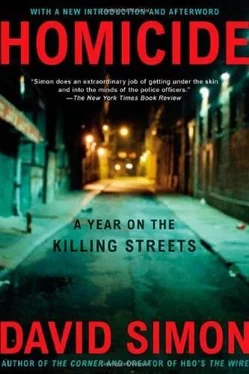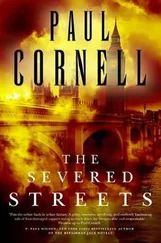Every detective also understands the need to take pleas on at least two-thirds or more of the viable murder prosecutions. Although most everyone outside the legal system regards “plea bargain” as a dirty word, those who make their living at the courthouse recognize it as a structural necessity. Without plea agreements, the system would lurch to a halt, with cases waiting for courtrooms the way commuter flights wait for runways in Atlanta. Even with the current ratio of pleas to trials, the delay between a murder indictment and the court trial averages between six and nine months.
But in a detective’s mind, there is a vast difference between a good plea and a bad one. Second-degree and thirty is always a respectable plea, except for truly evil acts such as, say, child abuse cases or robbery murders. If the case is borderline, second-degree and twenty isn’t too shabby, although it’s not exactly the iron fist of justice when you consider that the parole board puts most of them back on the street after about seven to ten. In a true manslaughter case-a domestic murder that was the act of fear or impulse, though it could in no way be called an accident-anything from two to ten is reasonable. But what’s hardest for a detective to swallow is a prosecutor allowing a particularly bad murder to go as second-degree, or calling a murder a manslaughter, or a manslaughter an accidental. Even in those instances, most detectives won’t speak their piece unless they’re asked, and the prosecutors don’t usually ask. In the homicide unit, the time-worn philosophy is that it’s on the prosecutor; you did your job, fuck him if he won’t do his. Occasionally, however, a detective will cross the emotional boundary.
Worden, for instance, has been known to say something to a young prosecutor who’s giving up on a file too quickly, or seems afraid to take a decent case into court. Landsman will sometimes do the same, and Edgerton, if you give him a chance, will tell a prosecutor how to try the case and then write out the closing argument. A lot of men in homicide carry around a case or two that still burns them. Garvey, for one, still isn’t saying much to the ASA who turned the Myeisha Jenkins murder into a second-degree plea-Myeisha, who was all of nine when her mother let her boyfriend beat the child to death and dump her on the shoulder of the Baltimore-Washington Parkway. Garvey told the lawyer he was a piece of shit for taking that plea, told it to him in such a way that the man didn’t even try to argue.
If he cares enough about a case, a detective can lobby or even argue for a particular strategy. But in the end, decisions about the legal approach to a case are not his to make. From crime scene to conviction, the courthouse is the only part of the process in which the detective becomes a passive participant, a player wholly dependent on the decisions of others. A detective is there to testify and otherwise serve the lawyers in any way he can. The lawyers, meanwhile, regard that service with varying amounts of appreciation. Some prosecutors consult the investigators on evidence and presentation, asking the opinions of veteran detectives who have been through the process more often than the attorneys. Others view the detectives as little more than props and gofers, responsible for showing up on time with the right evidence and the right witnesses.
Homicide detectives are further distanced from their cases because, as witnesses, they are sequestered and therefore prohibited from attending court and listening to other witnesses. Detectives in Baltimore spend 90 percent of their court time sitting on hard wooden benches in corridors, or running bags of evidence between the courtroom and the prosecutor’s office, or chasing down a witness who’s supposed to testify in the afternoon session but hasn’t shown up, or maybe bullshitting with the secretaries upstairs in the Violent Crimes Unit. Court time for a detective is a strange limbo, a period of nonexistence that is only briefly interrupted when he is called to testify.
The stand is the last point in the process in which a detective’s expertise counts for something. In most cases, the testimony of civilian witnesses-primed and prepared by the prosecutor before trial-will produce the most critical evidence. But in every case, the testimony of the detective, concerning the crime scene, the discovery of witnesses, the statements made by the defendant, lays the groundwork for the prosecution’s case. Among prosecutors, there is a theory that says a detective’s performance on the stand can rarely win a case, but it can be enough to wreck a prosecution.
Before taking the oath, a detective who knows his business makes a point of reading through the case file. After all, it’s been six months and a lot of bodies between the arrest and trial. In 1987, a city detective-no longer in the homicide unit-responded to a prosecutor’s question with an elaborate description of the crime scene and subsequent investigation. After a minute or two, he saw that the prosecutor was making strange faces. Even the defendant looked a little curious.
“Um, wait one second,” said the detective, coming to grips with the disaster. “Your honor, I think I’m remembering the wrong murder…”
That spells mistrial with a capital M.
Many detectives prefer to take the file onto the stand, but with some judges that can be dangerous. A typical case file contains notes and reports on potential suspects and blind alleys that were eventually discarded, and a few judges will allow a defense attorney, on cross-examination, to take hold of the file and go fishing. Given an alternate suspect from a police file and a tolerant judge, a defense attorney can run for miles in front of a jury.
One detective, Mark Tomlin, makes a point of copying his trial notes onto the back of the defendant’s computerized arrest sheet. Once, when Tomlin was testifying, a defense attorney asked to see his notes and began to suggest that they be admitted into evidence. He then turned the sheet over, looked at his client’s priors, and returned it without another word.
Veteran detectives also go into court knowing the strengths and weaknesses of their cases; they can anticipate a defense attorney’s line of questioning and answer accordingly. This doesn’t mean responding with answers that are grandly deceptive, but tailoring answers so that they do the least damage. If, for example, the defense counsel knows that your witness picked his client from a lineup but failed to do so in a photo array the previous day, he’s almost certainly going to ask about that. Anticipating, a good detective will, in the course of his answer, manage to work in the fact that the array used a picture of the suspect that was six years old, that the suspect’s hair was different, that he had no mustache and whatever else can be said before the lawyer stops him from talking. Defense attorneys have now endured untold generations of slick, manipulative police witnesses; one consequence is the just-answer-yes-or-no style of cross-examination, which requires a detective to wait for the prosecutor’s redirect to fully shape his answers.
On the other hand, if a detective is on the stand and not sure just where a defense attorney is going, his answers will become cautious and a little less specific, though not inaccurate in any detectable sense. A professional witness doesn’t needlessly back himself into corners with blanket declarations and assurances, because a good attorney will then manage to produce an exception.
“Detective, you say that after Mr. Robinson was arrested for this crime, the robberies in the area of North and Longwood ceased.”
“Yes, sir.”
“Detective, may I call your attention to a police report dated…”
Experienced detectives take one other rule to the stand with them: They don’t lie. The good ones don’t, anyway, not about anything that could ever be directly contradicted in open court. Perjury can destroy a career, steal a pension, and maybe, if the lie is big enough and stupid enough, lead to some jail time. For a detective to falsify evidentiary material, to wrongly attribute statements to suspects and witnesses, carries a risk far greater than the reward. How much does it matter-really matter-to the detective if any one suspect charged with any one murder goes to prison? He does fourteen of these guys a year, a couple hundred in a career. For what reason is he going to start believing that the world ends when he doesn’t win a case? If it’s a police shooting, or if it’s someone the cop knows, then some corners might be cut, but not for something that happened in the 1900 block of Etting Street on a Saturday night last summer.
Читать дальше












